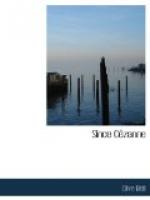But, though he offers the sensitive amateur an unusually generous allowance of the amateur’s most delicate pleasure, Friesz is, above all, a painters’ painter. He has been called a theorist. And, because he is a painter of exceptionally good understanding, who thinks logically about his art and can find words for what he thinks, I suppose the appellation is admissible. But, remember, he never dreams of trying to convert his theories of art into theories of life. His are not of the kind that can be so converted; I said he was a painters’, not a journalists’, painter. Also, unlike the theories of the mere craftsman, his are based always on the assumption that there is such a thing as art—something that is created by and appeals to peculiar faculties, something rare and personal, something not to be had simply by taking thought and pains, something as utterly unlike honest craftsmanship as it is unlike the cryptic mutterings of boozy mountebanks: subject, however, to this assumption, his theories are severely practical. They have to do solely with the art of painting; they are born of his own experience; and he makes visible use of them. That is why I call Friesz a painters’ painter. I wonder whether the Italian Primitives, with that disquietingly unself-conscious inspiration of theirs, directed with such amazing confidence along well devised, practical channels, were not a little like him.
The exhibition is fairly representative of Friesz’s later work; and if it cannot be said quite to summarize a stage of his career, at least it is a milestone. Friesz has arrived: that is to say, what he has already achieved suffices to affirm the existence of a distinct, personal talent entitled to its place in the republic of painting. At that point we leave him. But we may be sure that, with his remarkable gift and even more remarkable power of turning it to account, his energy, his patience, and his manifest ambition, he will soon have gone beyond it.
WILCOXISM
To return from Paris, full of enthusiasm for contemporary art, and find oneself forced immediately into an attitude of querulous hostility is surely a melancholy thing. It is my fate; but it is not my fault. Had I found our native quidnuncs in a slightly less exalted humour, had they gushed a little less over their imperial painters at Burlington House, had they made the least effort to preserve a sense of proportion, I, for my part, had held my peace. But, deafened by the chorus of hearty self-applause with which British art has just been regaling itself, [W] a critic who hopes that his country is not once again going to make itself the laughing-stock of Europe is bound at all risks to say something disagreeable.
[Footnote W: February 1920.]




